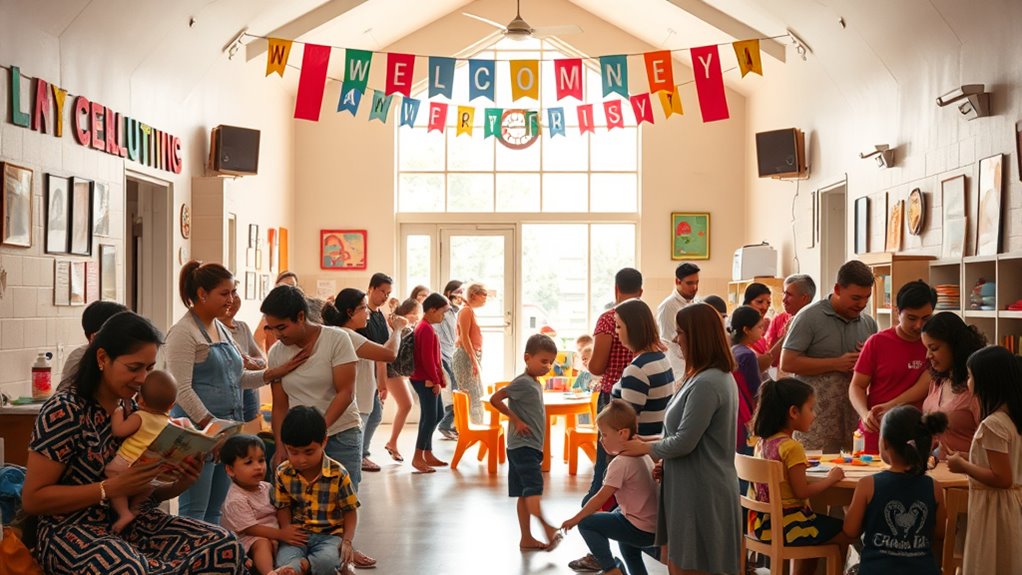Family Resource Centers (FRCs) are community hubs that provide essential services to families in need. They offer support like parenting guidance, mental health counseling, and financial planning, ensuring access for everyone, no matter their financial situation. FRCs promote community engagement and help strengthen family relationships. Investing in these centers leads to improved family well-being and stability. Want to discover more about the services and benefits these centers provide? There’s plenty more to explore!
Key Takeaways
- Family Resource Centers (FRCs) serve as community hubs, offering essential services like parenting support and mental health resources to families in need.
- With over 3,000 FRCs in the U.S., they ensure equitable access to services for all families, regardless of financial status.
- FRCs engage marginalized groups through outreach, promoting community bonds and reducing social isolation for families.
- Investing in FRCs provides a significant economic return, improving family stability and well-being while reducing child welfare involvement.
- They offer a range of services, including elder care planning and financial assistance, to support comprehensive family needs.

Family Resource Centers (FRCs) act as significant community hubs, offering a range of essential services designed to support families in need. With over 3,000 FRCs across the U.S. as of 2023, these centers are dedicated to providing accessible services to families, regardless of their financial situation. Whether you’re seeking parenting support, mental health services, or financial planning, FRCs are there to help you navigate the challenges of family life.
These centers emphasize a strengths-based, collaborative approach tailored to the unique needs of diverse communities. By focusing on family-centered services, FRCs engage in intentional outreach to marginalized groups, ensuring equitable access to community resources. This engagement strengthens community bonds and actively reduces social isolation, allowing families to connect and thrive together. The importance of planning ahead for elder care can also be a vital part of enhancing the overall well-being of families as they navigate care for elderly members. Additionally, FRCs often provide resources on financial assistance programs for families facing elder care expenses. End-of-life care is another critical aspect that FRCs can help families understand and navigate during challenging times.
Research indicates that investing in FRCs yields significant positive outcomes. For every dollar spent, there’s a staggering $4.93 return on investment, mainly by reducing child welfare involvement and improving parenting practices. This highlights how FRCs serve as protective factors, equipping families with the tools they need to create stable and nurturing environments for their children.
Investing in FRCs yields a remarkable $4.93 return for every dollar spent, empowering families and enhancing child well-being.
With early intervention services readily available, families can address potential issues before they escalate, ultimately enhancing child well-being.
Mental health support is another essential service offered by FRCs. You might find counseling and support groups that cater to various needs, helping to alleviate stress and improve overall family dynamics. When parents feel supported, they’re better equipped to nurture their children, creating a positive cycle of growth and development.
FRCs recognize that healthy families contribute to healthier communities, and they work diligently to enhance your access to these important services.
In addition to providing direct support, FRCs promote community engagement by offering workshops, events, and resources that foster collaboration among families. By participating in these activities, you not only gain valuable skills and knowledge but also create lasting connections with others in your community.
FRCs are dedicated to building stronger families and, ultimately, stronger communities through their extensive approach to family support.
Frequently Asked Questions
What Are the 5 Examples of Family Resources?
When you think about family resources, consider parenting education classes that help you strengthen communication skills.
You might find case management services that assist you in maneuvering healthcare and housing.
Counseling services can support you and your family through personal challenges.
Don’t forget about toy libraries that let you borrow engaging toys and books for your kids.
Finally, community referrals can connect you with specialized services like legal aid or counseling for domestic issues.
What Is a Family Resource Center?
A Family Resource Center (FRC) is a community hub that offers essential services and resources directly to families.
You’ll find support for parenting, mental health, and financial planning, making it easier to access help when you need it most.
FRCs focus on strengthening family functioning, preventing issues like child abuse, and promoting resilience.
They’re designed to be welcoming and accessible, ensuring everyone in the community can benefit regardless of their financial situation.
What Is Family Resource Center?
Imagine a lighthouse guiding ships safely to shore; that’s what a Family Resource Center (FRC) does for families.
It’s a welcoming space where you can find support, education, and resources tailored to your needs. You’ll discover parenting classes, counseling, and connections to community services designed to help you thrive.
FRCs empower you to build stronger family bonds and foster resilience, ensuring your journey through parenthood is smoother and more fulfilling.
What Is the Role of a Family Resource Center Coordinator?
As a Family Resource Center Coordinator, you oversee daily operations, ensuring families receive essential services.
You build partnerships with community organizations to enhance resources and develop programs that address parenting, financial literacy, and engagement.
By actively engaging with families, you gather feedback to adapt services as needed.
You also play a vital role in fundraising and grant writing, securing funding for sustainability and expanding the center’s offerings to better serve your community.
Conclusion
In steering through the complexities of family needs, Family Resource Centers serve as modern-day lighthouses, guiding you through turbulent waters. By connecting you with essential resources and support, they empower you to thrive amidst life’s challenges. Just as Odysseus relied on Athena for wisdom, you too can find guidance and strength within these centers. Embrace the opportunities they offer, and let them illuminate your path to a brighter family future, fostering resilience and unity along the way.









